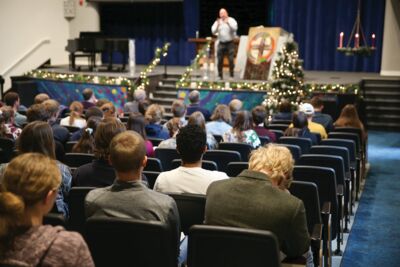
A Lutheran Chapel
Story: Danielle Luebbe
Photos: Liz Kucera and courtesy of Concordia Archives
Concordia’s chaplains have each put their own unique spin on chapel, but the mission of spending time in fellowship in the Word remains the same.
Praise God, from whom all blessings flow;
Praise Him, all creatures here below;
Praise Him above, ye heav'nly host:
Praise Father, Son and Holy Ghost.
Amen.
“I’m partial to the doxology at the beginning of chapel,” says Rev. Ryan Matthias, Concordia University, Nebraska’s current chaplain. “I started using that to quiet the crowd fourteen years ago rather than shouting.”
Matthias has been serving at Concordia since 2008 and beginning chapel with the doxology has become part of the daily routine on campus. But each chaplain before him also added their own particular flair to chapel. Concordia’s senior director of alumni and university relations, Jen Furr CO ’97 GR ’03, vividly recalls chapel service from her time as a student.
“When Pastor [Gregory] Mech ’75 would give the benediction, he would almost yell the word shine,” she says. “’May His face SHINE upon you!’ Sometimes when I hear the benediction now, I’ll wait to see if there’s that extra emphasis on ‘shine.’ I loved it.”
And most of the students who were here between 2001 and 2008 will remember Rev. Wesley “Bo” Baumeister ’85. “He would occasionally remove his prosthetic leg to illustrate a point in chapel,” says Corrie Johnson ’08, now assistant director of graduate recruitment for Concordia. “It was wild.”
"Chaplain Baumeister's transparency and reliance on the Lord amid adversity was inspiring," notes Rev. Russ Sommerfeld, assistant to the president for church engagement.
Rev. Gordon Gross was Concordia’s first called chaplain in 1971. Prior to that, the position of Dean of Chapel was established in 1966 and held by Rev. Erwin Kolb. “He assigned chapel leaders,” says university archivist, Dr. Jerry Pfabe. “In the 1960s and beyond, faculty were assigned to lead chapel, even if one was not good at it. That assignment system continued until recent years. In those years we had few outside leaders, such as pastors of neighboring congregations.”
During the 1960s until 1972 when Concordia High School graduated its last class, there were two morning chapel services. The first was for college students and the second for the high school. “The services were brief,” Pfabe says, “about 15 minutes. And they were more formal—leaders, whether clergy or not, wore vestments.”
Previous to 1966, the responsibility of finding faculty to lead chapel fell to the Dean of Men, who reported to the Dean of Students.
There are some things about Concordia’s chapel that don’t change, however, such as the charge of spending time in God’s Word.
Focused on Faith A timeline of Concordia's chaplains
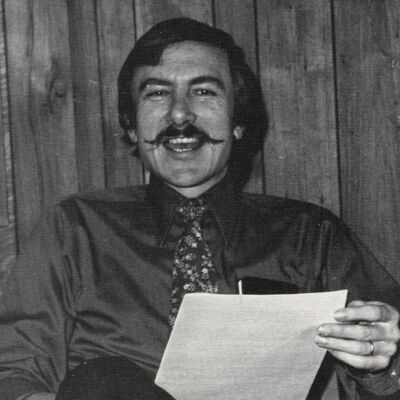
1971 Rev. Gordon Gross
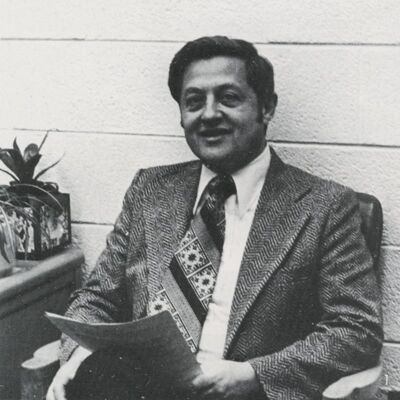
1977 Rev. Richard Pflieger
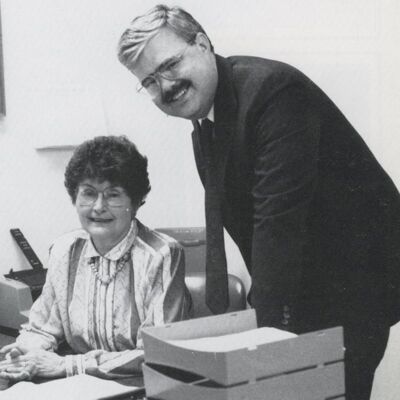
1990 Rev. Gregory Mech
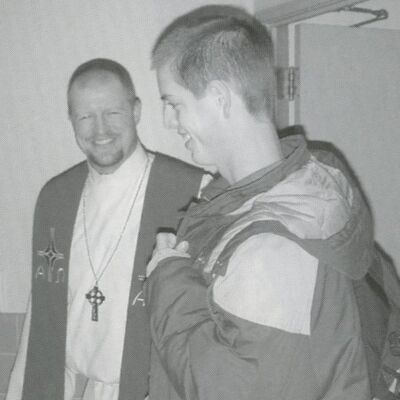
2001 Rev. Wesley Baumeister
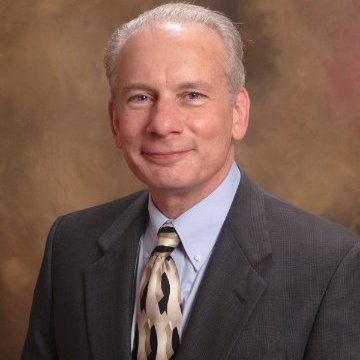
2008 Rev. Thomas Schoech, interim
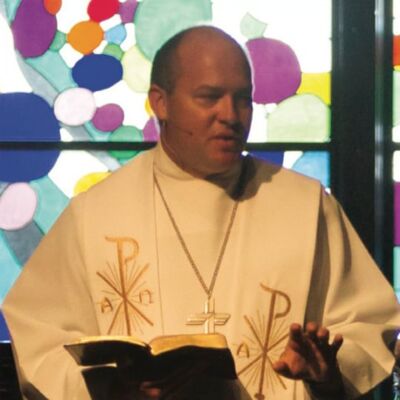
2008 Rev. Ryan Matthias
“Our chapel looks a lot like Acts 2:42: 'And they devoted themselves to the apostles’ teaching and the fellowship, to the breaking of bread and the prayers,’” says Matthias. “We are led by the Word, gather together as the family of Christ, at times receive the Lord’s supper and we pray as Christ commanded us to do.”
Matthias tries to choose texts for chapel that students probably haven’t heard before, ones that they aren’t getting in church on Sunday. “This may be the only place they’ll ever get to hear a text from Nahum or Jude preached on,” he says. “Sometimes the pastors roll their eyes about the texts that I assign, but I think it’s good for us to consider the entire Word given to us.”
We are led by the Word, gather together as the family of Christ, at times receive the Lord’s supper and we pray as Christ commanded us to do.
Another thing that makes Concordia’s chapel special is the plethora of local pastors and ordained faculty members and alumni who are willing to come and share with campus. Students and faculty and staff get to hear different takes on the scripture, listen to different voices and experience the various ways different pastors lead chapel.
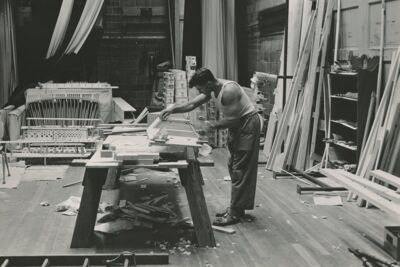
Even when guest preachers are in charge of leading the campus community through the selected text, Matthias still does quite a bit of preparation to make sure chapel runs smoothly.
“Every day I look at the text assigned for chapel, read through it and put one thought in my mind just in case the scheduled preacher doesn’t show up because of an emergency,” says Matthias. “On the days that I am assigned, I’ll be thinking on that text for the better part of a few days. When I’m walking around campus or towards home, I’m mulling the text over and praying about what I think God wants the students and staff to hear.”
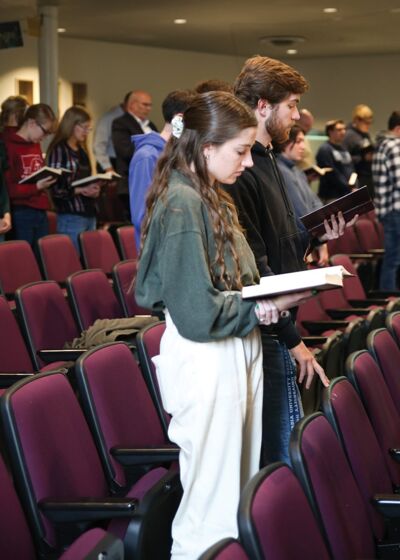
Weekly, more than 1,500 students attend chapel services, which are held every weekday, Monday through Friday, at 11 a.m. The Tuesday and Thursday chapels are livestreamed to Concordia’s Facebook page and are viewed by nearly 1,000 members of the wider Concordia community each day.
Matthias shares the Monday through Wednesday texts with Dr. Jeffrey Blersch, professor of music and Concordia’s university organist, so he can choose hymns accordingly. Thursday and Friday texts are sent to student band leaders so they can prepare songs for the more contemporary services on those days.
It’s important to make chapel as impactful as possible.
Going to chapel builds good habits, Matthias says. A daily chapel probably won’t be offered in most students’ lives once they graduate, so learning to create space to spend time reflecting on God’s Word each day is important.
“I think chapel is way for all of us to understand the necessity of relaxing in the Word every day,” he says. “Prayerfully, it creates a set aside time for the rest of the students’ lives to make time for meditation on the Word.”
Matthias is trying to create an experience through chapel where students and others can contemplate the Bible and be in community with other Christ-followers, to pray with and for each other and find a quiet moment outside the rigors of college life.
“It’s nice to have a worshipful community to support and sustain you during some of the tough times of college.”